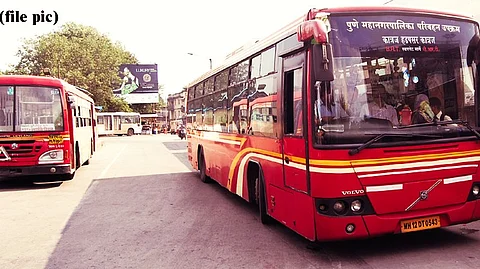

Pune: The Pune Mahanagar Parivahan Mahamandal Limited (PMPML) is grappling with a staggering financial crisis, as its total operational deficit has surged to ₹766 crore, according to the latest 2023-24 audit report presented to the Standing Committee. The report, compiled by PMC Chief Auditor Jitendra Kolbe, highlights serious inefficiencies, including excessive non-passenger travel (dead kilometers) and rising operational costs.
A major concern is the 13.05 lakh kilometers of dead kilometers—non-passenger travel—which has resulted in an additional ₹24.68 crore loss. In 2023-24, PMPML buses covered 12.17 crore kilometers, out of which 1.305 crore kilometers were non-revenue generating routes.
Adding to this, frequent breakdowns of old buses have negatively impacted PMPML’s service efficiency. The total per-kilometer cost stands at ₹114.24, while the revenue per kilometer is only ₹53.28, leading to a ₹60.96 loss per kilometer.
PMPML has been operating at a loss for over a decade, with the deficit jumping from ₹99 crore (11 years ago) to ₹766 crore in the current fiscal year. PMC and Pimpri-Chinchwad Municipal Corporation (PCMC) provide financial support, covering 60% and 40% of the operational loss, respectively. However, the majority of the burden falls on PMC.
The deficit has worsened significantly in recent years. In 2022-23, PMPML recorded a ₹726.78 crore operational loss, which has now increased by ₹40 crore in 2023-24.
Key Reasons Behind the Growing Losses
No fare revision for tickets and passes
Declining ticket sales and pass revenue
Weak enforcement by ticket inspection squads
No significant cost-saving initiatives in operations
Increase in salary expenses after implementation of the Seventh Pay Commission
₹24.68 crore loss due to dead kilometers (non-passenger travel)
Aging buses frequently breaking down, reducing overall efficiency
Proposed Measures to Reduce the Deficit
Capping unnecessary expenses and increasing cost-efficiency
Strengthening ticket inspection teams to curb revenue leakages
Reviewing and adjusting ticket and pass fares to increase revenue
Reducing dead kilometers and optimizing route planning
Increasing the number of operational buses to enhance service efficiency
Repairing and maintaining aging buses to prevent frequent breakdowns
Exploring commercial use of PMPML assets to generate additional revenue
